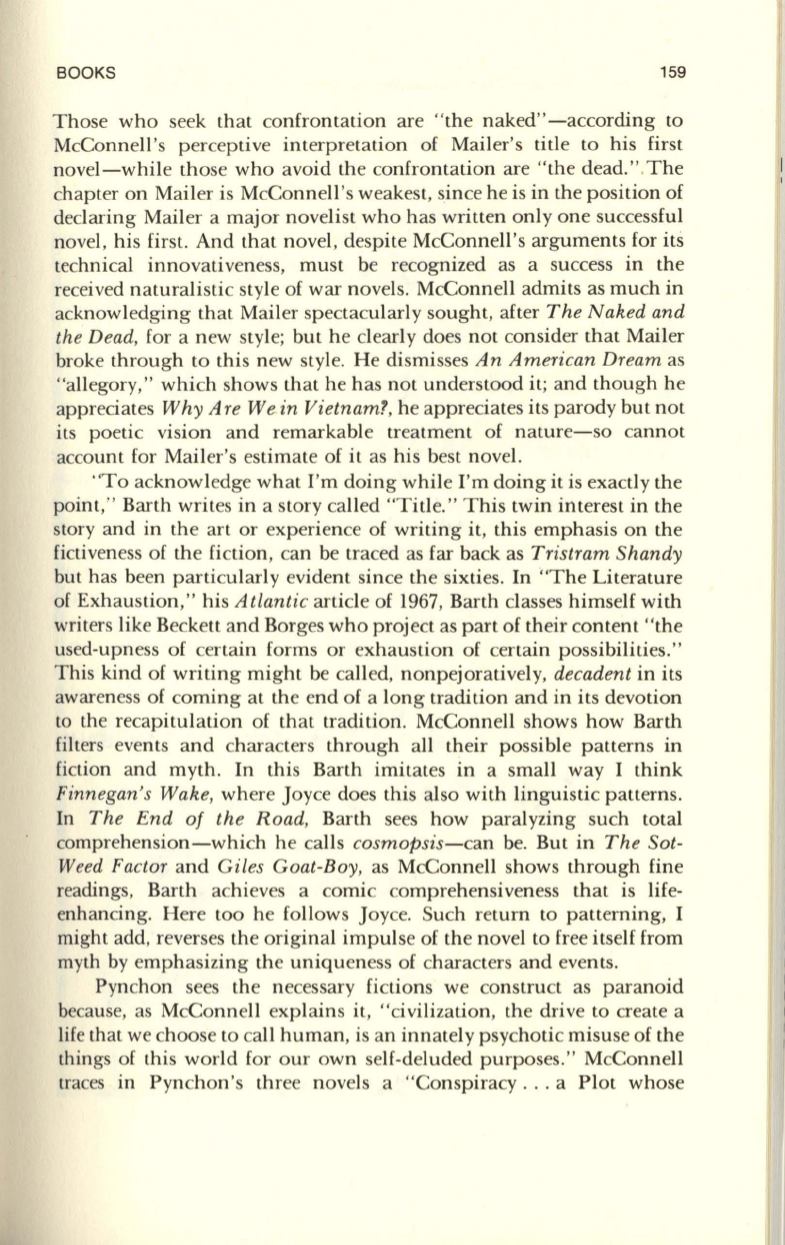
BOOKS
159
Those who seek that confrontation are " the naked" -according to
McConnell 's perceptive interpretation of Mailer's title to his first
novel-while those who avoid the confrontation are "the dead. " .The
chapter on Mailer is McConnell 's weakest, since he is in the position of
declaring Mailer a major novelist who has written only one successful
novel, his first. And that novel , despite McConnell's arguments for its
technical innovativeness, must be recognized as a success in the
received naturalistic style of war novels. McConnell admits as much in
acknowledging that Mailer spectacularly sought, after
The Naked and
the Dead,
for a n ew style; but he clearly does not consider that Mailer
broke through to this new style. He dismisses
An American Dream
as
"allegory," which shows that he has not understood it; and though he
appreciates
Why Are We in Vietnam?,
he appreciates its parody but not
its poetic vision and remarkable treatment of nature-so cannot
account for Mailer's estimate of it as his best novel.
'To acknowledge what I'm doing while I'm doing it is exactly the
point;' Barth writes in a story called "Title. " This twin interest in the
story and in the art or experience of writing it, this emphasis on the
fictiveness of the fiction , can be traced as far back as
Tristram Shandy
but has been particularly evident since the sixties.
In
"The Literature
of Exhaustion, " his
Atlantic
article of 1967, Barth classes himself with
writers like Beckett and Borges who project as part of their content "the
used-upness of certain forms or exhaustion of certain possibilities."
This kind of writing might be called, nonpejoratively,
decadent
in its
awareness of coming at the end of a long tradition and in its devotion
to the recapitulation of that tradition. McConnell shows how Barth
filters events and characters through all their possible patterns in
fiction and myth .
In
this Barth imitates in a small way I think
Finnegan's Wake,
where Joyce does this also with linguistic patterns.
In
The End of the Road,
Barth sees how paralyzing such total
comprehension-which he calls
cosmopsis-can
be. But in
The Sot–
Weed Factor
and
Giles Goat-Boy,
as McConnell shows through fine
readings, Barth achieves a comic comprehensiveness that is life–
enhancing. Here too he follows Joyce. Such return to patterning, I
might add, reverses the original impulse of the novel to free itself from
myth by emphasizing the uniqueness of characters and events.
Pynchon sees the necessary fictions we construct as paranoid
because, as McConnell explains it, "civilization, the drive to create a
life that we choose to call human, is an innately psychotic misuse of the
things of this world for our own self-deluded purposes." McConnell
traces in Pynchon's three novels a "Conspiracy ... a Plot whose


